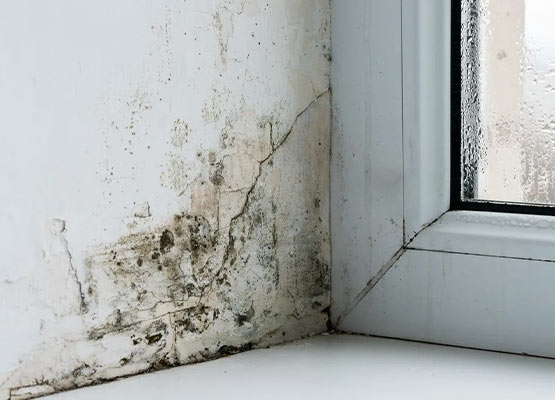
Understanding Toxic Mold
There is one critical issue that homeowners might experience while owning a home: toxic black mold. Understanding and managing mold is essential for maintaining a healthy living environment in a humid climate like the one we have in Louisiana. This comprehensive guide will cover what toxic mold is, its various types, why it's a significant concern, and what you can do about it if you find it growing at your property in Baton Rouge, New Orleans, Lafayette, or Denham Springs.

What is Toxic Mold?
Toxic mold refers to certain mold types that produce mycotoxins, harmful substances that can pose health risks. While not all molds are toxic, black mold is toxic. Its spores can cause various health issues, from allergies to more severe conditions. Molds thrive in moist, warm environments, making your homes particularly vulnerable.
How Can I Identify Toxic Mold in My Louisiana Gulf Coast Home?
Properly identifying mold takes highly specialized laboratory equipment. No one, not even the most highly trained people in the world, can identify mold by simply looking at it. If you suspect there is mold growth in your home or business, you should always reach out to a trained professional for proper testing and identification.
Most types of mold commonly grow in moist areas like bathrooms, kitchens, basements, or areas with water damage. However, not all molds are easily visible, and sometimes testing is necessary.
Common Types of Toxic Mold at Your Property
- Stachybotrys Chartarum (Black Mold): This infamous mold is known for its black color and potential to cause respiratory issues. It commonly appears in water-damaged buildings.
- Aspergillus: A mold in the environment that can become an indoor problem, especially in HVAC systems. It can cause allergic reactions and respiratory infections.
- Penicillium: Often seen in water-damaged materials, this mold spreads quickly and can lead to various health problems, including allergies and asthma.
Why Is Mold a Major Concern on the Louisiana Gulf Coast?
The humid climate of Baton Rouge & the Louisiana Gulf Coast region, with its frequent rainfall and propensity for flooding, creates ideal conditions for mold growth. Mold can grow unseen within walls, under floors, or in attics, leading to potential health risks and property damage. When visible, mold splotches typically are colored black, brown, green, or white.
Health Risks Associated with Mold Exposure
Mold exposure can lead to numerous health issues, particularly for those with allergies or asthma. Symptoms can range from coughing, wheezing, and throat irritation to more severe conditions like lung infections in immunocompromised individuals.
Mold Prevention and Remediation Strategies in Baton Rouge & Zachary
- Regular Inspection: Regularly inspect your home for signs of mold, especially in high-moisture areas like bathrooms, kitchens, and basements.
- Control Humidity: Use dehumidifiers and air conditioners to keep indoor humidity between 40-60%.
- Prompt Repairs: Fix leaks and water damage promptly to prevent mold growth.
- Proper Ventilation: Ensure your home is well-ventilated, particularly in bathrooms and kitchens.
- Professional Mold Remediation: Proper removal is key to preventing those unwanted mold spores from being dispersed throughout unaffected areas of the property, potentially causing more damage than starting with.
Frequently Asked Questions
Exposure to toxic mold can cause respiratory problems, allergic reactions, headaches, skin irritation, and, in severe cases, neurological issues or systemic infections, especially in immunocompromised individuals.
Not all mold is toxic. Many types of mold do not produce harmful toxins and are relatively harmless, though they can still cause allergic reactions in some people.
Mold grows in moist, warm, and cold conditions. Mold only needs two things to grow, an organic food source and enough water. For cold conditions, think of food that has gone bad in your refrigerator; this is a low-humidity, cold environment.
Temperature and the amount of moisture available will limit/determine what species of mold is more likely to grow.
Prevent mold growth by controlling indoor humidity levels (ideally between 40-60%), ensuring good ventilation, fixing leaks promptly, and keeping the house clean and dry.
In many places, landlords are legally required to provide habitable housing, which includes addressing mold issues. Tenants should report mold to their landlord and request remediation. The specific legal implications can vary by location.
Mold testing can be done using DIY home testing kits or by hiring professionals. Professional testing is more accurate and can identify the specific type of mold present. Frontier Restoration Gulf Coast DOES NOT TEST for mold but we can recommend a qualified professional who does.
It is challenging to eliminate all mold spores in a home environment. However, mold growth can be effectively controlled and managed by eliminating moisture sources, cleaning existing mold, and preventing its recurrence through maintenance and vigilance.
Rely on Us for Mold Removal in New Orleans, Baton Rouge, Lafayette, & Lake Charles
Understanding and managing toxic mold is crucial for maintaining a healthy home environment in Baton Rouge & Louisiana Gulf Coast Area. By staying informed about the types of mold, their health risks, and effective prevention and remediation strategies, you can protect your home and your health. Remember, the Frontier Restoration Gulf Coast team is always ready to assist with your mold concerns. Our crews are available 24/7/365.
Call Us at 225-396-2171












